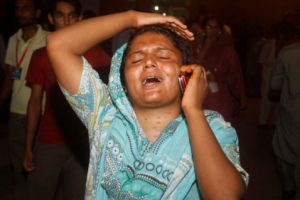 The International Labour Organization (ILO) has called for national action to protect workers' health and safety, following the deaths of at least 240 workers in a garment factory in Karachi, Pakistan.
The International Labour Organization (ILO) has called for national action to protect workers' health and safety, following the deaths of at least 240 workers in a garment factory in Karachi, Pakistan.
Seiji Machida, Head of ILO's SafeWork Programme, underlined the need for concrete action to prevent such tragedies. "We were shocked by the news we heard that well over 200 workers were killed in a factory fire today. Protection of workers' safety and health is a fundamental human right. We need to reinforce measures to protect workers' lives from hazards in the workplace. We would like to call for national action to improve the protection of all workers," he said.
According to media reports, many victims were trapped in a basement with no fire exits and locked doors. Most died from suffocation when the basement filled with smoke. Other workers on higher floors rushed to windows to escape but struggled to get out because metal bars blocked their way. Hours earlier, at least 25 people died in a shoe factory fire in the Pakistani city of Lahore.
Tragedies like these, said Machida, are all too common in the region. In 1993, 188 workers, mainly women, died in a toy factory in Thailand.
"Almost 20 years after the tragedy in Thailand, we still see similar disasters. The risk of death or injuries from fire hazards in the workplace, continue to be an important issue. I would like to call for the strengthening of legal and other supporting measures to improve workplace safety and health in all countries, particularly in developing countries. We call for action to realize Decent Work must be safe work for all."
The ILO office in Pakistan added, 'We have been highlighting the importance of Safe Work in Pakistan at forums organized with government, employers and workers and encouraging a Labour Inspection regime that protects the workers."
The ILO has adopted more than 40 standards specifically dealing with occupational safety and health, as well as over 40 Codes of Practice. Nearly half of the ILO's instruments deal directly or indirectly with occupational safety and health issues.
Deadly fires prompt demands for safer Pakistan workplaces


